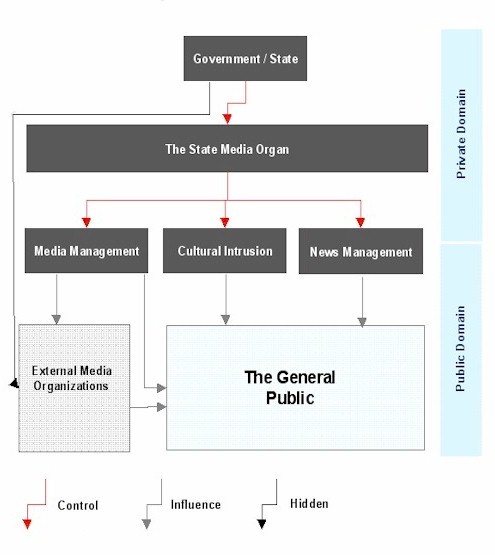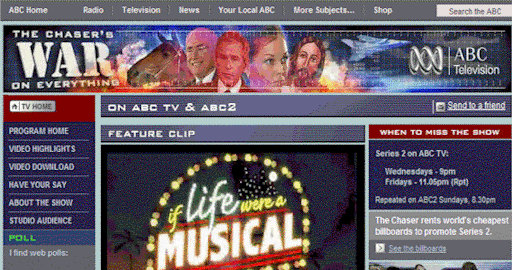THE ABC OF OPINION MANAGEMENT: PART 2
| For a more profound understanding of media influence upon public opinion, it is beneficial to examine the generic models and methods employed across the world, both current and past. This area of research identifies a range of scenarios, with scale varying from selective and superficial influence, to unrelenting social psychological propaganda. Within this, the role of the official state-owned media organ is often pivotal, both in terms of shaping opinion, and indeed orchestrating the process itself. Whilst this is particularly evident with respect to totalitarian regimes (such as those in North Korea, Iran and even the old Soviet Union) it is important to understand that it is in fact inherent to most nations, to some extent. Equally, whilst the degree and scope may vary considerably, examination of the actual processes used identifies remarkable similarities of approach. The processes themselves embrace a far wider and more complex model than just crude manipulation of news delivery. They include direct intrusion into cultural output, as well as often less than subtle guidance of commercial media outlets.  This broad model is widely recognized, widely used, and extremely successful in framing and directing public opinion. It is actively used in varying degrees across the world, albeit generally with respect to a limited range of focus. AUSTRALIA In Part 1 of this investigation we discussed the ABC's remarkable alignment with apparent government position following the astonishing government backed statements made by AFP Commissioner Keelty, which sent such damaging signals (for Schapelle Corby) to the Indonesian regime in May 2005. We also provided a recent example of the apparent repression of news which is supportive of Schapelle Corby, to illustrate that these issues remain current to this day. In this part of our investigation we will begin to explore a wider canopy of ABC influence, and by virtue of specific examples, consider how closely it fits the three part model described above. PART 1: MANAGEMENT OF THE MEDIA Within regimes such as those referenced above, management of other media outlets tends to be a particularly important aspect of the overall role of the state media organ. Direct behind the scenes communication by government is sometimes backed up by the broadcast and publication of material critical of them, which is intended to keep them in line, and perhaps warn them that the state disapproves of their output, or simply indicate that they are out of sync with perceived national interests. AUSTRALIA In Australia, the ABC broadcasts Media Watch. This "investigates" and comments on the material and broadcasts of all media channels and publications. Naturally, it is extremely influential within the media sector itself, and attracts a very media centric audience.  In May 2005 the Australian public witnessed a number of abuses of Schapelle Corby's legal and human rights directly on television. Public opinion was overwhelmingly supportive of her and even public disorder was a possibility. Much of the media reflected this situation, reporting the actual events. Their output was also aligned with public opinion. This sympathetic and supportive public opinion was widespread, and was putting the Australian government's strategic relationship with Indonesia at risk of considerable, and possible long term, damage. It was potentially creating political instability between the two nations. This is frequently cited as the reason for the astonishing government backed statements we have referenced, which significantly harmed Schapelle Corby's prospects. THE ABC On 30th May 2005 (within days of Keelty's statement), the ABC launched a series of extraordinary attacks upon Channel 9 in particular, via Media Watch. In fact, almost the entire show was dedicated to this. Its ferocity and sustained nature was astonishing:
The open message to the rest of the Australian media from the ABC, regarding requisite Schapelle Corby reporting, would therefore appear to be rather clear. PART 2: CULTURAL OUTPUT INTRUSION The use of non-news broadcasts to condition and influence a population is an established channel within the overall framework of opinion management. It can be extremely effective, particularly over the medium and longer terms. This channel is often used to create a common 'understanding' of values, and generic or subliminal acceptance of key messages, which for various reasons, including sensitivity, cannot be stated openly via direct news or documentary output. It is a hugely complex field, often embracing great subtlety, but it is also widely recognized, and indeed documented, by students of propaganda and related media studies. An example of a discipline within this channel is the use of humour or comedy. This lends itself particularly well to certain aspects, such as expanding the parameters and boundaries of political correctness or acceptability, and the insidious undermining of targeted individuals often via insinuation. AUSTRALIA It is a matter of record that the ABC's non-news broadcasts were awash with less than helpful references to Schapelle Corby and her family at various stages of the tragic story. This is particularly the case with respect to "comedy". This is, in fact, evident even to this very day. Take the following, for example, extracted just five minutes ago from the ABC website:  This is far from subtle, but let's analyze it regardless. Bush and Howard are clearly individuals for whom it is "politically correct" to target humour of the most cutting and perhaps edgy type. They were national leaders, politically hardened, and the subject of countless barbs and jokes worldwide. They effectively signed on for this, with eyes open, when they entered politics. But Schapelle Corby? A young woman, subjected to a series of legal and human rights abuses, and struggling daily just to survive in barely imaginable conditions? Why would the ABC place her image there, other than to signal that it is somehow politically correct and socially acceptable to malign her and her family with the same brand of humour as Bush and Howard? Some might even suggest that Bush and Howard are largely discredited (and even depicted as "bad guys") with similar connotations for Schapelle Corby by association. It is extremely hard to find any sort of justification or rationale for this crude example of image placement which does not involve the play of negative influence on the public at large. But it is actually the tip of a very large and disturbing iceberg. PART 3: NEWS MANAGEMENT The news and documentary channels of state media organs are of course prime vehicles for propaganda and opinion management by regimes throughout the world. The output can range from simple political spin, to sophisticated censorship and message delivery manipulation. With respect to those individual citizens targeted by states in order to support an underlying political imperative, additional possibilities emerge, which embrace insidious and direct character assassination, false allegation, and relative news positioning. AUSTRALIA The ABC's news related output with respect to Schapelle Corby is a matter of record. They have pitched a variety of high profile broadcasts against Schapelle Corby's interests, and those of her family, engaging in some of the most damaging of the false allegations and smears. This has been presented on a systematic basis, over a period of years. To illustrate that this campaign is still current, in the first part of this series we cited a recent example of apparent censorship. But their long term coverage and non-coverage of Schapelle Corby news is actually littered with serious issues and hugely damaging innuendo. Certain employees of the ABC seem to have excelled in this type of grossly unethical activity. A simple illustrative example of such an ABC smear? Perhaps that of August 2008, when ABC produced a headline report "Corby's dad linked to drug trade", courtesy of its Lateline broadcast. It presented smear after smear, via scurrilous statements such as "Together, the father Michael Corby senior and his daughter Schapelle Corby represent 30 years in the marijuana business" and "his long drug career, Michael Corby senior avoided going to jail". Clearly, the significant damage which this caused was not just at point and time of the broadcast itself, but was ongoing, as the seeds had been sown. The subsequent tiny apology on their website ("Lateline apologises for a story aired last month with evidence suggesting that Schapelle Corby's father, the Late Michael Corby Senior was involved in the drug trade.") and a 20 second snippet on air doesn't even begin to repair the harm inflicted to Schapelle Corby's welfare, which this and countless others across the media spectrum have contributed to. I am sure that all ethical journalists will be appalled by this, especially bearing in mind the high profile nature of the original broadcast, and the fact that the ABC will surely have been well aware of the damaging nature of such smears for the very real prospects of Ms Corby. Unsubstantiated innuendo of a similar nature had been made many times previously, and even, incredibly, whilst Schapelle Corby was in legal process with respect to her appeal. Again, these are matters we will cover in greater depth in future articles, but in truth they are readily available for readers to research for themselves. AND THE THREE PART MODEL? Our own opinion on the degree of alignment and correlation of all this with the three part opinion management model cited at the start of this article is not material: the information produced above largely speaks for itself. However, the underlying issues discussed should concern everyone: not only ethical journalists. As grave and unacceptable as they are with respect to Schapelle Corby, the implications are actually even wider. If the ABC is as intrinsic to the state apparatus as the above data suggests, then what other issues are they influencing? CLICK HERE FOR PART 3 Labels: abc, australian broadcasting corporation |






Comments on "THE ABC OF OPINION MANAGEMENT: PART 2"
-
 Anonymous said ... (March 27, 2009 10:04 PM) :
Anonymous said ... (March 27, 2009 10:04 PM) :
-
 Anonymous said ... (March 31, 2009 1:09 PM) :
Anonymous said ... (March 31, 2009 1:09 PM) :
post a commentHow much longer is this injustice likely to carry on....??? It will be interesting to see whether anyone in Australia will ever be held accountable for their involvement in Schapelle's unlawful incarceration in Indonesia. The "untouchables" takes on a whole new meaning, don't you think...?
From the very beginning of the charade in the Schapelle Corby case I have been appalled at the way in which the whole business, especially the so-called court case has be conducted. I'm also dismayed at the inertia by the general public. I debate wherever and whenever I can. I always end with the fact that I believe in her innocence but even if she is not innocent, it is an indictment on all of Australia that Schapelle should have been given such a heavy sentence and that she should be left to experience, on a daily basis, such horrific conditions.